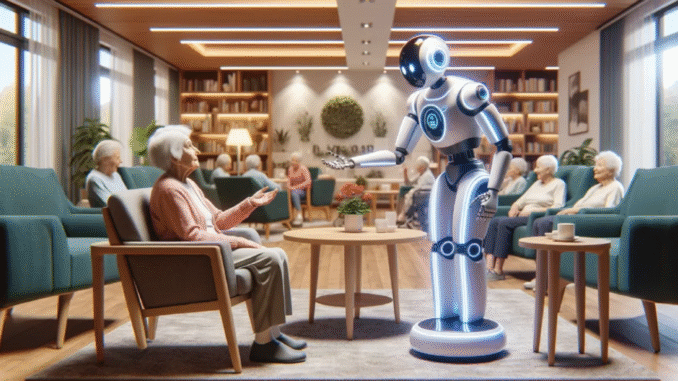
Artificial Intelligence (AI) was once a concept confined to science fiction. Today, it’s an integral part of our daily lives, reshaping how we live, work, and interact. From the way we control our homes to the way we receive medical care, AI’s influence is growing rapidly. In 2025, AI is not just a futuristic dream—it’s a practical reality driving convenience, efficiency, and innovation in every sector.
Let’s take a closer look at how AI is revolutionizing everyday life, with particular focus on its transformative effects in smart homes and healthcare.
AI in Smart Homes: Making Daily Living More Intelligent
Smart homes are no longer a luxury reserved for tech enthusiasts. Thanks to AI, they are becoming mainstream, making everyday living easier, more energy-efficient, and personalized.
1. Voice-Activated Assistants
Devices like Amazon’s Alexa, Google Assistant, and Apple’s Siri have made voice-activated technology a household norm. AI allows these systems to understand natural language, recognize patterns, and improve their responses over time. Whether it’s setting reminders, playing music, controlling lights, or answering questions, voice assistants are making daily tasks effortless.
2. Smart Appliances
AI-powered appliances like refrigerators, washing machines, and ovens are now capable of learning your habits and preferences. For example, smart refrigerators can monitor their contents, suggest recipes based on what’s inside, and even order groceries automatically when supplies run low.
3. Energy Management
AI-driven thermostats, like Google Nest, learn your schedule and optimize heating and cooling to save energy without sacrificing comfort. Smart lighting systems adjust brightness based on the time of day or occupancy, significantly reducing energy consumption and bills.
4. Home Security
AI-enhanced security systems use facial recognition, behavioral analysis, and real-time alerts to make homes safer. Smart cameras and doorbells can distinguish between familiar faces and potential intruders, notifying homeowners instantly and even alerting authorities when needed.
AI in Healthcare: Transforming Diagnosis, Treatment, and Patient Care
Perhaps nowhere is AI’s impact more profound than in healthcare. By enhancing diagnostic accuracy, personalizing treatments, and streamlining administrative processes, AI is helping both patients and healthcare providers achieve better outcomes.
1. Early Diagnosis and Predictive Analytics
AI algorithms can analyze vast amounts of medical data to detect diseases like cancer, diabetes, and heart conditions at earlier stages than traditional methods. Tools like IBM’s Watson Health and Google’s DeepMind Health are pioneering AI applications that assist doctors in diagnosing complex illnesses faster and with greater accuracy.
Predictive analytics, powered by AI, can forecast potential health risks based on a patient’s history, lifestyle, and genetic data. This proactive approach enables preventative care, reducing the need for costly treatments later on.
2. Personalized Medicine
AI allows for the development of customized treatment plans tailored to an individual’s unique genetic makeup, lifestyle, and health history. Instead of the one-size-fits-all approach, AI ensures treatments are more effective, reducing side effects and improving recovery times.
Pharmaceutical companies are also using AI to accelerate drug discovery and development, analyzing biological data to find potential new treatments much faster than traditional research methods.
3. Virtual Health Assistants
Virtual health assistants, like AI chatbots and apps, are transforming patient interaction. These tools provide 24/7 support, answering health-related queries, scheduling appointments, sending medication reminders, and offering mental health support. This accessibility is especially crucial in rural or underserved areas where healthcare providers may be scarce.
4. Robotic Surgery
AI-powered robotic systems, such as the da Vinci Surgical System, enable surgeons to perform intricate procedures with greater precision and less invasiveness. These technologies improve outcomes, reduce recovery times, and minimize complications during surgery.
Beyond Smart Homes and Healthcare: Other Areas of Everyday Life Transformed by AI
AI’s impact extends far beyond our homes and hospitals. It’s touching nearly every aspect of life:
- Transportation: Self-driving cars and AI-enhanced traffic management systems are reshaping urban mobility, aiming for safer and more efficient transportation networks.
- Retail: AI personalizes shopping experiences, from product recommendations to virtual try-ons. Automated checkout systems are reducing wait times and enhancing convenience.
- Finance: AI is revolutionizing banking through fraud detection, customer service chatbots, personalized investment advice, and risk assessment models.
- Education: Intelligent tutoring systems, automated grading, and AI-driven personalized learning paths are making education more accessible and effective.
Challenges and Ethical Considerations
While the benefits of AI are numerous, there are also challenges that need to be addressed:
- Privacy Concerns: AI systems often require access to vast amounts of personal data, raising concerns about how this data is stored, shared, and protected.
- Bias and Fairness: AI algorithms can inadvertently inherit biases present in their training data, leading to unfair or discriminatory outcomes, particularly in areas like healthcare and criminal justice.
- Job Displacement: Automation powered by AI can replace human jobs, particularly in industries like manufacturing, customer service, and transportation, leading to societal and economic disruptions.
- Accountability: As AI systems make more decisions independently, determining who is responsible when things go wrong becomes more complex.
Addressing these challenges requires thoughtful regulation, transparent development practices, and collaboration between tech companies, governments, and communities.
Conclusion
AI is no longer just a glimpse of a futuristic world—it’s a powerful force shaping our everyday lives. From smart homes that cater to our preferences to healthcare systems that detect illnesses early and personalize treatments, AI’s positive impacts are profound and growing.
However, as we embrace these advancements, it’s crucial to proceed with caution, ensuring that AI development prioritizes fairness, transparency, and human well-being. In doing so, we can fully harness the incredible potential of AI to make everyday life smarter, healthier, and more connected for everyone.
In 2025 and beyond, AI isn’t just changing the future—it’s redefining the present.
Leave a Reply